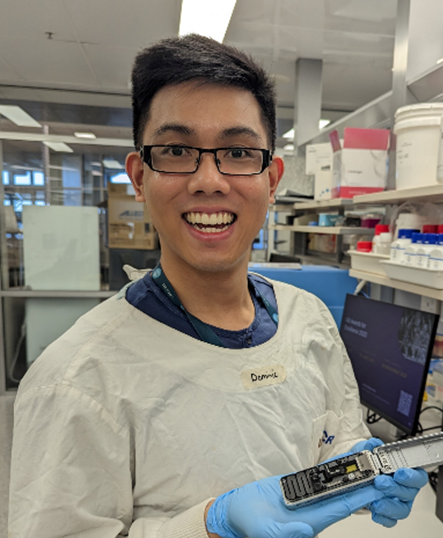Vaibhavi Joshi and Dr Dominic Guanzon
NDRG1 in Breast cancer Brain metastasis: A clinical biomarker with potential therapeutic targetability
 Speaker: Vaibhavi Joshi
Speaker: Vaibhavi Joshi
Bio: Vaibhavi Joshi is a 3rd year PhD student at Lakhani group working towards finding clinically relevant proteins as biomarkers in breast cancer brain metastasis. She graduated with a Bachelors degree in Biotechnology engineering at SRM university, India, followed by Masters in Molecular Biology from the University of Queensland. Vaibhavi’s interest in cancer research started when she was fourteen and found out that whales do not get cancer, after which she wanted to study whales to develop anti-cancer vaccines. Years later her research projects involved developing vaccines targeting Glioblastoma and Melanoma. Her current focus is around bridging the gap between molecular and clinical science and to get a better understanding of clinically relevant approaches.
Overview: Brain metastases are secondary brain tumours defined by their aggressive nature, heterogeneity, poor prognosis, and debilitating treatment regime. Amongst the different primary tumours, breast cancer is the most common primary tumour in women to spread to the brain. Lack of biomarkers and specific targeted therapies are major roadblocks for brain metastasis treatment making it a critical field of study. This work proposes N-myc downregulated gene-1 (NDRG1) as a clinically relevant biomarker in breast cancer-brain metastasis patients. NDRG1 has been variably reported as a metastasis suppressor, a biomarker of poor outcome, and a facilitator of disease progression in a range of different cancers. NDRG1 is poorly characterised in cancer due to its context dependent, pleiotropic role. In this study we performed an in-depth clinico-pathological analysis of NDRG1 in BC and matched BC-BrM patients and explored its functional role under cellular stress in BC and BrM cells.
Nanopore long-read sequencing of DNA and application to extracellular vesicles
 Speaker: Dr Dominic Guanzon
Speaker: Dr Dominic Guanzon
Bio: Dominic Guanzon is a research fellow at the University of Queensland within the Salomon Lab, and supported by the Lions Medical Research Foundation. His expertise lies in the fascinating realm of extracellular vesicles where he is the genomics theme leader. Dominic’s research involves developing nucleic acid blood tests to diagnose disease. His primary focus revolves around two critical areas: ovarian cancer chemoresistance and musculoskeletal complications in children with blood cancer.
Overview: Dominic will deliver an engaging presentation on the significance of DNA found in extracellular vesicles and highlight its advantages over cell-free DNA. The audience will be presented with data showcasing our techniques for separating, extracting, and examining the length profile of DNA from these two distinct components in plasma. Moreover, we will share preliminary findings obtained through advanced long-read Nanopore sequencing, for the analysis of ovarian cancer genomic DNA. By optimizing this sequencing methodology, we aim to extend its application to extracellular vesicles, further expanding our understanding of their genetic makeup.
About UQ Centre for Clinical Research Seminars
The UQ Centre of Clinical Research (CCR) Seminars are held fortnightly on Wednesdays from 12pm - 1pm (except during school holidays) in the CCR Auditorium, Herston. The series features topics in the field of research, presented by invited international, interstate and local researchers.
